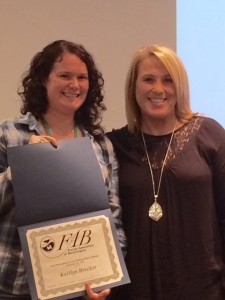NSU Newsroom
SharkBytes
Horizons
This version of NSU News has been archived as of February 28, 2019. To search through archived articles, visit nova.edu/search. To access the new version of NSU News, visit news.nova.edu.
This version of SharkBytes has been archived as of February 28, 2019. To search through archived articles, visit nova.edu/search. To access the new version of SharkBytes, visit sharkbytes.nova.edu.
Halmos Graduate Students Present at the Florida Association of Benthologists Conference

Kaitlyn Brucker, left, an M.S. in Marine Biology candidate at the Halmos College of Natural Sciences and Oceanography, receives an award from Julianne Knight Gray, president of the Florida Association of Benthologists.
Kaitlyn Brucker and Candace Grimes, graduate students at the Halmos College of Natural Sciences and Oceanography, presented their work at the Florida Association of Benthologists (FAB) Annual Meeting, held November 4–6, 2015, in Clearwater, Florida.
FAB is a nonprofit organization that shares expertise and information on the use of aquatic community structures and processes (quantity and quality of the biota) to evaluate water quality conditions and ecosystem function. The annual meeting showcases research involving marine, freshwater, or estuarine taxonomy and the ecology of benthic organisms.
Brucker’s presentation, “Discovery of Novel Commensal Amphipod in Endemic New Zealand Tunicate Cnemidocarpa bicornuta,” was selected by a panel of qualified scientists as the best graduate student presentation, for which she received a plaque and a monetary award. Brucker is pursuing an M.S. in Marine Biology and an M.S. in Coastal Zone Management. She completed the B.S. in Marine Biology program at NSU in 2012.
Grimes, who is pursuing an M.S. in Marine Biology, is a research assistant in the college’s Department of Marine and Environmental Sciences. She presented her research, “Establishing an Ecological Baseline of Infauna Seasonally in Nearshore Sediments of Southeast Florida.”
“There are multiple personal, academic, and professional advantages for students presenting their research in oral presentations at scientific meetings,” said James D. Thomas, Ph.D., professor at the college and graduate advisor for Brucker and Grimes. “These include preliminary activities of submitting an abstract for acceptance, and then registering for the conference and organizing travel and accommodations. Preparing the talk requires diligence in meeting target presentation times and ensuring that the aspects of the research are communicated clearly and effectively. This requires organizing the presentation to time constraints and assembling data and information in an entertaining manner.
“At the conference, students get to mix with peers and colleagues and network within their specialty,” Thomas said. “During their presentation, I encourage students to engage the audience and present their research project findings. Questions from the audience also provide input from the attendees, and many participants follow up during the meeting with additional comments and suggestions. These experiences build confidence and prepare graduate students to operate in the scientific community.”